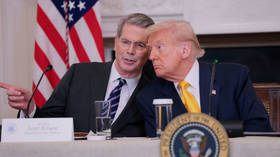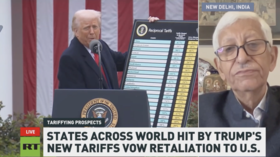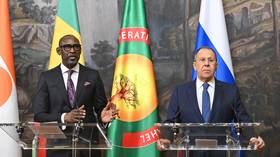What to do with Russia? Senate tries to issue ‘prescription’
The US is mulling a new strategy and a “better trajectory” in terms of relations with Russia that could serve its interests. The Senate lambasted Moscow’s “negative behavior” and widespread propaganda, while ignoring the US’ own actions.
On Tuesday, the US Senate Committee on Foreign Affairs devoted one of its hearings to a lengthy discussion of “Russian Violations of Borders, Treaties, and Human Rights.”
Capitol Hill has primarily been focusing on “recognizing” what the Committee’s Chairman Bob Corker (R-Tenn.) called in his opening statement “new realities of US-Russia” relations, which he also described as “distrustful” and “confrontational.”
The main goal lawmakers are aiming for is to “implement a new strategy that puts us on a better trajectory,” Corker said.
Moscow calls NATO buildup in E. Europe ‘unjustified’ as largest drills since Cold War kick off https://t.co/4IThutir73
— RT (@RT_com) June 6, 2016
“We are charged with a higher responsibility, which is not only to diagnose the problem, but to begin generating prescriptions for where we go next,” he added.
To paint a broader picture, the committee requested that Victoria Nuland, assistant secretary of state for Europe, and Michael Carpenter, deputy assistant secretary of defense, should testify before them.
Both have outlined approaches that they believe would bring an end to “Russian aggression.”
Increase ‘NATO footprint’ to beat Russian proactive actions
In 2015, the US used $985 million approved by Congress for its European Reassurance Initiative (ERI) to engage all 28 NATO members in anti-Russia maneuvers “on land, sea, and air.” In Obama’s request for 2017, this figure rose to $3.4 billion as in the near future Washington plans to enhance its presence in Eastern Europe.
The US also wants all of its NATO allies to spend at least 2 percent of their GDP on defense.
NATO is currently holding Anaconda 2016 drills, one of its largest military games since the Cold War. The costly exercise involves over 31,000 troops from 24 countries.
Gear up US nuclear sector
Speaking before the Committee, Carpenter outlined his department’s approach to Russian “coercion”, which includes “coordinating efforts across the forces to strengthen our capabilities, posture, investments and plans.”
Yet, he stressed that Washington keeps in mind a “possibility of working with Russia when it is in our interest.”
NATO-Russia #nuclear war ‘possible within a year’ – ex-NATO chief https://t.co/wP2wm2MZvqpic.twitter.com/N6G4dm9s3R
— RT (@RT_com) May 19, 2016
According to Carpenter, the US is modernizing its nuclear forces, which would see the development of a new long-range strategic bomber, ballistic missile submarine and an air-launch cruise missile.
The president's 2017 budget secured $19 billion for the Department of Defense to cover its upgrade of US nuclear enterprises.
Stiffen anti-Russian sanctions over Ukraine
Nuland, who in 2014 famously said “f**k the EU” during the Kiev coup, has now said that the US is working “intensively” to have them “roll over” economic restrictions on Moscow at the end of June.
READ MORE: 'F**k the EU': Snr US State Dept. official caught in alleged phone chat on Ukraine
“While Moscow has not yet changed its approach to Ukraine, our readiness to toughen sanctions even further has likely played a role in deterring further Russian efforts to grab Ukrainian territory,” she told the Committee.
In 2013, Nuland was among the US politicians who visited Ukraine to support the opposition. She was spotted handing out buns to protesters on Maidan Square in central Kiev, alongside many other providers of free tea and food from the general population.
$787 million to battle ‘pressure from Moscow’
In February, US lawmakers requested $787 million in foreign assistance funding for Europe and Eurasia for the next year. Since 2015, this request has increased by $32 million amid growing US eagerness to protect Ukraine, Georgia, and Moldova in the face of "Russian aggression."
There, Nuland said, Washington’s “assistance is reorienting economies away from excessive dependence on Russia.”
Speaking before the Committee, Carpenter said that Russia continues “to put pressure on Georgia through a variety of means.”
Countering Russian propaganda
Since 2014, the US has spent about $100 million to counter Russian propaganda, including expenditures by State Department, USAID [US Agency for International Development], BBG (Broadcast Board of Governors).
Poland plans 35,000-strong paramilitary force to deter ‘Russian threat’ https://t.co/IlhShpNIip
— RT (@RT_com) June 3, 2016
“But this pales in comparison to the $400 million at least that Russia is spending and frankly to the levels that we spent during the Cold War on this kind of things which were over $1 billion a year,” Nuland said.
READ MORE: Talking out of both sides of their mouths: Tuesday's bizarre US Senate hearings about RT
The BBG requested $751.5 million in funding of its “mission” for 2016, including efforts to fight “Russian aggression and Russian language propaganda aim to destabilize Europe.”
This is two-and-a-half times that of RT, which is estimated at roughly $307 million annually.














